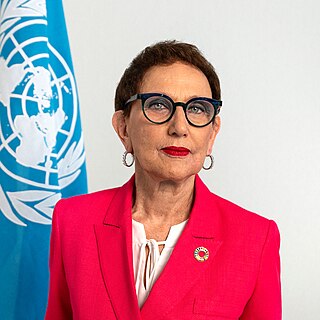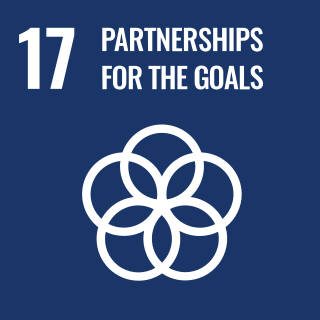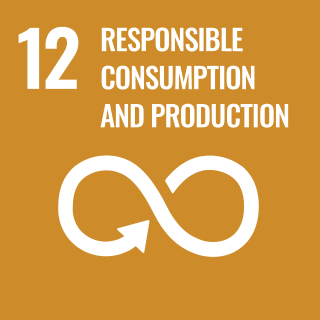
UN Trade and Development (UNCTAD) is an intergovernmental organization within the United Nations Secretariat that promotes the interests of developing countries in world trade. It was established in 1964 by the United Nations General Assembly (UNGA) as the United Nations Conference on Trade and Development but rebranded to its current name on the occasion of its 60th anniversary in 2024. It reports to both the General Assembly and the United Nations Economic and Social Council (ECOSOC). UNCTAD is composed of 195 member states and works with non-governmental organizations worldwide; its permanent secretariat is at UNOG in Geneva, Switzerland.

The United Nations Economic Commission for Europe is one of the five regional commissions under the jurisdiction of the United Nations Economic and Social Council. It was established in order to promote economic cooperation and integration among its member states.
A green economy is an economy that aims at reducing environmental risks and ecological scarcities, and that aims for sustainable development without degrading the environment. It is closely related with ecological economics, but has a more politically applied focus. The 2011 UNEP Green Economy Report argues "that to be green, an economy must not only be efficient, but also fair. Fairness implies recognizing global and country level equity dimensions, particularly in assuring a Just Transition to an economy that is low-carbon, resource efficient, and socially inclusive."

Jomo Kwame Sundaram is a Malaysian economist. He is a senior adviser at the Khazanah Research Institute, visiting fellow at the Initiative for Policy Dialogue, Columbia University, and an adjunct professor at the International Islamic University (IIUM).
The New International Economic Order (NIEO) is a set of proposals advocated by developing countries to end economic colonialism and dependency through a new interdependent economy. The main NIEO document recognized that the current international economic order "was established at a time when most of the developing countries did not even exist as independent states and which perpetuates inequality." In the spirit of "trade not aid," the NIEO called for changes in trade, industrialization, agricultural production, finance, and transfer of technology. The United Nations General Assembly adopted the "Declaration for the Establishment of a New International Economic Order" and its accompanying program of action on 1 May 1974.

A smallholding or smallholder is a small farm operating under a small-scale agriculture model. Definitions vary widely for what constitutes a smallholder or small-scale farm, including factors such as size, food production technique or technology, involvement of family in labor and economic impact. There are an estimated 500 million smallholder farms in developing countries of the world alone, supporting almost two billion people. Smallholdings are usually farms supporting a single family with a mixture of cash crops and subsistence farming. As a country becomes more affluent, smallholdings may not be self-sufficient, but may be valued for providing supplemental sustenance, recreation, and general rural lifestyle appreciation. As the sustainable food and local food movements grow in affluent countries, some of these smallholdings are gaining increased economic viability in the developed world as well.
The United Nations Statistics Division (UNSD), formerly the United Nations Statistical Office, serves under the United Nations Department of Economic and Social Affairs (DESA) as the central mechanism within the Secretariat of the United Nations to supply the statistical needs and coordinating activities of the global statistical system. The Division is overseen by the United Nations Statistical Commission, established in 1947, as the apex entity of the global statistical system and highest decision making body for coordinating international statistical activities. It brings together the Chief Statisticians from member states from around the world.
The United Nations Sustainable Development Group (UNSDG), previously the United Nations Development Group (UNDG), is a consortium of 36 United Nations funds, programmes, specialized agencies, departments and offices that play a role in development. It was created by the Secretary-General of the United Nations in order to improve the effectiveness of United Nations development activities at the country level.
Clean growth is goal 7 of the UN's sustainability goals, first published in 2009. Clean growth refers to economic growth that is energy efficient, uses sustainable agricultural practices, and uses renewable energy technologies according to the ‘Poles’ outlined in the UN's Sustainable Development Goals. In other words, it is economic growth tied to conscious and sustainable principles with the aim of reducing, minimising, or eliminating altogether the potential negative side effects that economic and income growth can have on the environment.

Rebeca Grynspan Mayufis is a Costa Rican economist who has been serving as Secretary-General of the UN Trade and Development (UNCTAD) since 13 September 2021.

Green growth is a concept in economic theory and policymaking used to describe paths of economic growth that are environmentally sustainable. It is based on the understanding that as long as economic growth remains a predominant goal, a decoupling of economic growth from resource use and adverse environmental impacts is required. As such, green growth is closely related to the concepts of green economy and low-carbon or sustainable development. A main driver for green growth is the transition towards sustainable energy systems. Advocates of green growth policies argue that well-implemented green policies can create opportunities for employment in sectors such as renewable energy, green agriculture, or sustainable forestry.

Lakshmi Murdeshwar Puri is a former assistant secretary-general at the United Nations and the former deputy executive director of UN Women. Prior to her 15-year stint at the United Nations, she served as an Indian diplomat for 28 years. From 1999 until 2002, she was India's Ambassador to Hungary, while also concurrently accredited to Bosnia and Herzegovina.

The International Institute for Sustainable Development (IISD) is an independent think tank founded in 1990 working to shape and inform international policy on sustainable development governance. The institute has three offices in Canada - Winnipeg, Ottawa, and Toronto, and one office in Geneva, Switzerland. It has over 150 staff and associates working in over 30 countries.
Natural capital accounting is the process of calculating the total stocks and flows of natural resources and services in a given ecosystem or region. Accounting for such goods may occur in physical or monetary terms. This process can subsequently inform government, corporate and consumer decision making as each relates to the use or consumption of natural resources and land, and sustainable behaviour.
UNCTAD's Division on Investment and Enterprise (DIAE) is a research and policy practice centre of the United Nations Conference on Trade and Development whose work focuses on investment and enterprise with a particular view on development. The Division's overarching mandate is to steer sustainable development and inclusive growth objectives through investment and enterprise development, productive capacity-building, industrialization and economic diversification. Its work programme is tailored to serve all UN member States, with a particular emphasis on the needs of least-developed and other structurally weak and vulnerable economies.

Climate change education (CCE) is education that aims to address and develop effective responses to climate change. It helps learners understand the causes and consequences of climate change, prepares them to live with the impacts of climate change and empowers learners to take appropriate actions to adopt more sustainable lifestyles. Climate change and climate change education are global challenges that can be anchored in the curriculum in order to provide local learning and widen up mindset shifts on how climate change can be mitigated. In such as case CCE is more than climate change literacy but understanding ways of dealing with climate
The Addis Ababa Action Agenda was the outcome of the 2015 Third International Conference on Financing for Development, held in Addis Ababa, Ethiopia. It was adopted by heads of state and government on 15 July 2015. 174 United Nations member states sent delegations; 28 heads of State, vice presidents and heads of government attended. Governments were joined by the heads of the United Nations, the International Monetary Fund (IMF), the World Bank and the World Trade Organization (WTO), prominent business and civil society leaders, and other stakeholders. The agreement is a follow-up to the 2002 Monterrey Consensus and the 2008 Doha Declaration on Financing for Development.

Sustainable Development Goal 17 is about "partnerships for the goals." One of the 17 Sustainable Development Goals established by the United Nations in 2015, the official wording is: "Strengthen the means of implementation and revitalize the global partnership for sustainable development". SDG 17 refers to the need for the nonhegemonic and fair cross sector and cross country collaborations in pursuit of all the goals by the year 2030. It is a call for countries to align policies.

Sustainable Development Goal 12, titled "responsible consumption and production", is one of the 17 Sustainable Development Goals established by the United Nations in 2015. The official wording of SDG 12 is "Ensure sustainable consumption and production patterns". SDG 12 is meant to ensure good use of resources, improve energy efficiency and sustainable infrastructure, provide access to basic services, create green and decent jobs, and ensure a better quality of life for all. SDG 12 has 11 targets to be achieved by at least 2030, and progress towards the targets is measured using 13 indicators.
The United Nations Forum on Sustainability Standards (UNFSS) is an initiative with a steering committee of six United Nations Agencies – Food and Agriculture Organization (FAO), International Trade Centre (ITC), UN Environment, UN Industrial Development Organization (UNIDO), United Nations Economic Commission for Europe (UNECE), and the UN Conference on Trade and Development (UNCTAD) is the secretariat of UNFSS. UNFSS headquarters are in Geneva.











